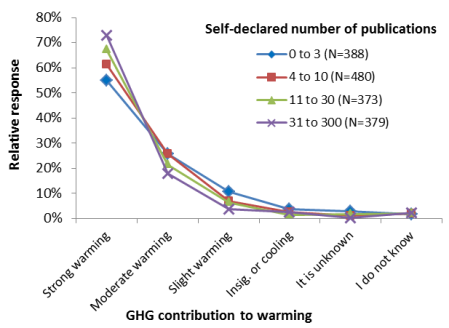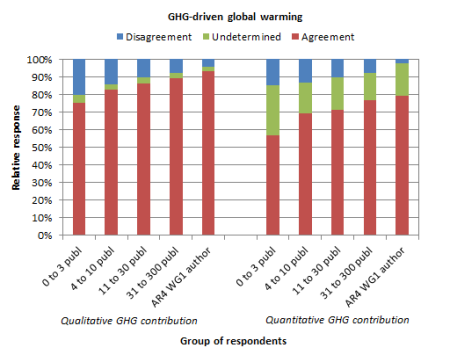Survey confirms scientific consensus on human-caused global warming
Posted on 11 August 2014 by Bart Verheggen
This is a repost from Bart Verheggen's blog.
- A survey among more than 1800 climate scientists confirms that there is widespread agreement that global warming is predominantly caused by human greenhouse gases.
- This consensus strengthens with increased expertise, as defined by the number of self-reported articles in the peer-reviewed literature.
- The main attribution statement in IPCC AR4 may lead to an underestimate of the greenhouse gas contribution to warming, because it implicitly includes the lesser known masking effect of cooling aerosols.
- Self-reported media exposure is higher for those who are skeptical of a significant human influence on climate.
In 2012, while temporarily based at the Netherlands Environmental Assessment Agency (PBL), my colleagues and I conducted a detailed survey about climate science. More than 1800 international scientists studying various aspects of climate change, including e.g. climate physics, climate impacts and mitigation, responded to the questionnaire. The main results of the survey have now been published in Environmental Science and Technology (doi: 10.1021/es501998e).
Level of consensus regarding attribution
The answers to the survey showed a wide variety of opinions, but it was clear that a large majority of climate scientists agree that anthropogenic greenhouse gases are the dominant cause of global warming. Consistent with other research, we found that the consensus is strongest for scientists with more relevant expertise and for scientists with more peer-reviewed publications. 90% of respondents with more than 10 climate-related peer-reviewed publications (about half of all respondents), agreed that anthropogenic greenhouse gases (GHG) are the dominant driver of recent global warming. This is based on two different questions, of which one was phrased in similar terms as the quintessential attribution statement in IPCC AR4 (stating that more than half of the observed warming since the 1950s is very likely caused by GHG).

Figure 1. The more publications the respondents report to have written, the more important they consider the contribution of greenhouse gases to global warming. Responses are shown as a percentage of the number of respondents (N) in each subgroup, segregated according to self-reported number of peer-reviewed publications.
Literature analyses (e.g. Cook et al., 2013; Oreskes et al., 2004) generally find a stronger consensus than opinion surveys such as ours. This is related to the stronger consensus among highly published – and arguably the most expert – climate scientists. The strength of literature surveys lies in the fact that they sample the prime locus of scientific evidence and thus they provide the most direct measure of the consilience of evidence. On the other hand, opinion surveys such as ours can achieve much more specificity about what exactly is agreed upon and where the disagreement lies. As such, these two methods for quantifying scientific consensus are complementary. Our questions possibly set a higher bar for what’s considered the consensus position than some other studies. Furthermore, contrarian viewpoints were likely overrepresented in our study compared with others.
No matter how you slice it, scientists overwhelmingly agree that recent global warming is to a great extent human caused.

Figure 2. The more publications the respondents report to have written, the more they agree with greenhouse gases being the main contributor to global warming (red bars). IPCC AR4 authors report the most agreement with GHG-driven global warming. Results are based on two different questions, one about the qualitative contribution of GHG (Q3) and one about the quantitative contribution of GHG (Q1).The latter question resulted in more “undetermined” answers (unknown, I don’t know, or other), presumably because it was more difficult to answer. Hence the percentage of consensus can best be compared by excluding these “undetermined” answers. Responses are shown as a percentage of the number of respondents in each subgroup.
The concept of ‘consensus’ has been discussed a lot lately. Whereas the presence of widespread agreement is obviously not proof of a theory being correct, it can’t be dismissed as irrelevant either: As the evidence accumulates and keeps pointing in the same general direction, the experts’ opinion will converge to reflect that, i.e. a consensus emerges. A theory either rises to the level of consensus or it is abandoned, though it may take considerable time for the scientific community to accept a theory, and even longer for the public at large.
Greenhouse warming versus aerosol cooling
By phrasing Question 1 analogously to the well-known attribution statement of AR4 we found something peculiar: Respondents who were more aware of the cooling effect of aerosols in greater numbers assessed the greenhouse gas contribution to recent warming to be larger than the observed warming (consistent with the IPCC assessments). We concluded that the AR4 attribution statement may lead people to underestimate the isolated greenhouse gas contribution. The comparable AR5 statement is an improvement in this respect.
Media exposure
Respondents were also asked about the frequency of being featured in the media regarding their views on climate change. Respondents who thought climate sensitivity was low (less than 1.75 degrees C per doubling of CO2) reported the most frequent media coverage. Likewise, those who thought greenhouse gases had only made an insignificant contribution to observed warming reported the most frequent media coverage. This shows that contrarian opinions are amplified in the media in relation to their prevalence in the scientific community. This is related to what is sometime referred to as “false balance” in media reporting and may partly explain the divergence between public and scientific opinion regarding climate change (the so-called “consensus gap”).

Figure 3. The most frequent media coverage is reported by respondents who estimated climate sensitivity to be lowest (
Survey respondents
Respondents were selected based on a few criteria: Having authored articles with the key words ‘global warming’ and/or ‘global climate change’, covering the 1991–2011 period via the Web of Science. This is the same database used by Cook et al in their recent ERL study (PS: John Cook is co-author on this current study as well). Respondents were also selected based on inclusion in the climate scientist database assembled by Jim Prall, as well as by surveying the recent climate science literature. Prall’s database includes signatories of public statements disapproving of mainstream climate science. They were included in our survey to ensure that the main criticisms of climate science would be included. This last group amounts to less than 5% of the total number of respondents, about half of whom only published in the gray literature on climate change.
Survey questions
Detailed questions were posed about a variety of physical climate science issues, which are discussed in the public debate about climate change. Answer options reflected a variety of viewpoints, all of which were phrased as specific and neutral as possible. Before executing the survey, questions and answers (pdf) were reviewed by physical and social scientists and climate change public commentators with a wide range of opinions (see acknowledgements for a list of names), to minimize the chance of bias.
Comments on the survey by respondents varied: some said it was slanted towards the ‘alarmist’ side (“Obviously these questions were posed by warmists”), but more respondents commented that they thought it was slanted towards the ‘skeptical’ side (“I suspect this survey comes from the denial lobby”).
——————-
Reference: Bart Verheggen, Bart Strengers, John Cook, Rob van Dorland, Kees Vringer, Jeroen Peters, Hans Visser, and Leo Meyer, Scientists’ Views about Attribution of Global Warming, Environmental Science and Technology, 2014. DOI: 10.1021/es501998e. Supporting Information available here. The article is open access.
An FAQ for this article is here.
A Dutch version of this blogpost is here.































 Arguments
Arguments






























From the pdf link to the list of survey questions, only question 1 mentions "human induced". But for question 1, there is a part a and part b, each with multiple choices. So I am confused about what exactly the answers were that determined the red bars in figure 2. Because even for AR4 authors, there is less than 80% agreement (red bar) for question 1. Could someone please clarify? Thanks.
rkrolph,
I think Q5 in the FAQ answers your question.
Q3 asks about the contribution of GHG and other factors to Global Warming. This blogpost explains why it may be better to exclude the 'undetermined' answers when calculating a consensus percentage.
Bart V.,
Thanks for the feedback. So, close to 20% of the AR4 authors were at least undetermined or unsure with respect to the precisely worded AR4 attribution statement. I think this survey was a great way to show where the consensus really is right now. I hope they do this survey in a year as I would expect the consensus should converge toward 100% as more evidence is gathered and the science improves. Unless, of course, legitimate contrarian evidence surfaces which would cause the numbers to go downward. This type of survey is a good way for non-experts to gauge that trend, without having to understand all the nuances of the scientific debate. That is important since it is the non-scientific public that needs to be convinced.
rkrolph,
I don't think that's quite true. Broadly agreeing with a dominant role of GHG in recent warming doesn't necessarily translate in being able to -or feeling comfortable to- put a relatively precise percentage range on it. In this case, choosing between the 3 categories (51-75; 76-100; >100%) that are all consistent with at least the most well known attribution statement. Because of the difficulty in choosing between these categories, many decided to fill out 'unknown' or 'don't know'. In many cases this can imo be interpreted as "we or I don't know the answer to that question to the level of precision that the answer options imply". An important argument for this interpretation is the comparison with the answers to Q3.
I don't think the answers to such a survey would be materially different a year from now. A year is a very short time in terms of scientific progress. Plus, the reasons as outlined above will still be valid, even as even more scientists may agree with the IPCC position.